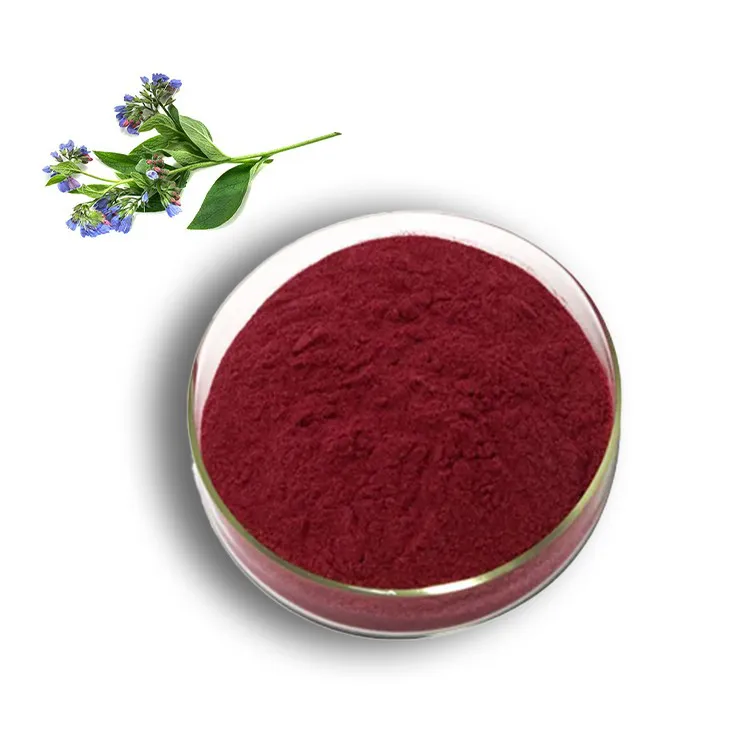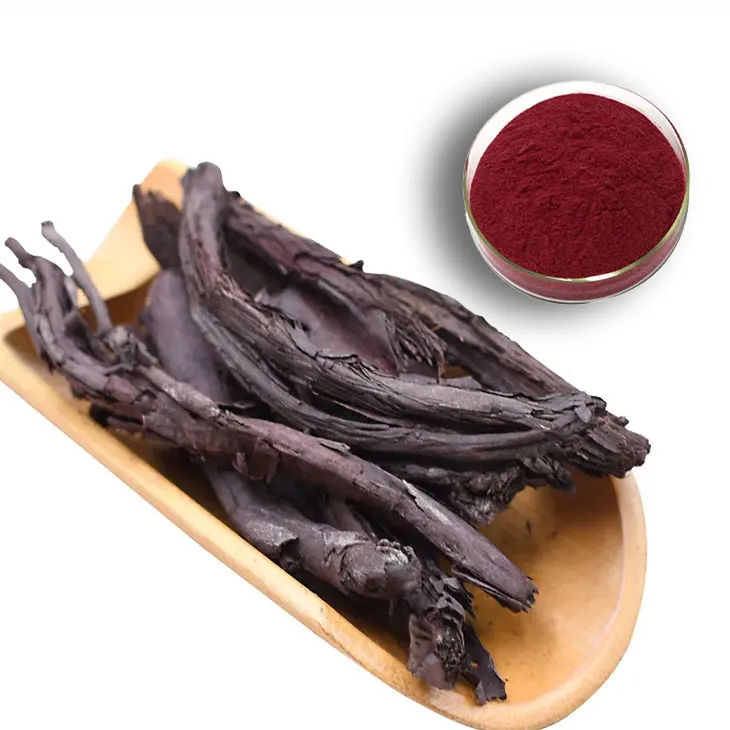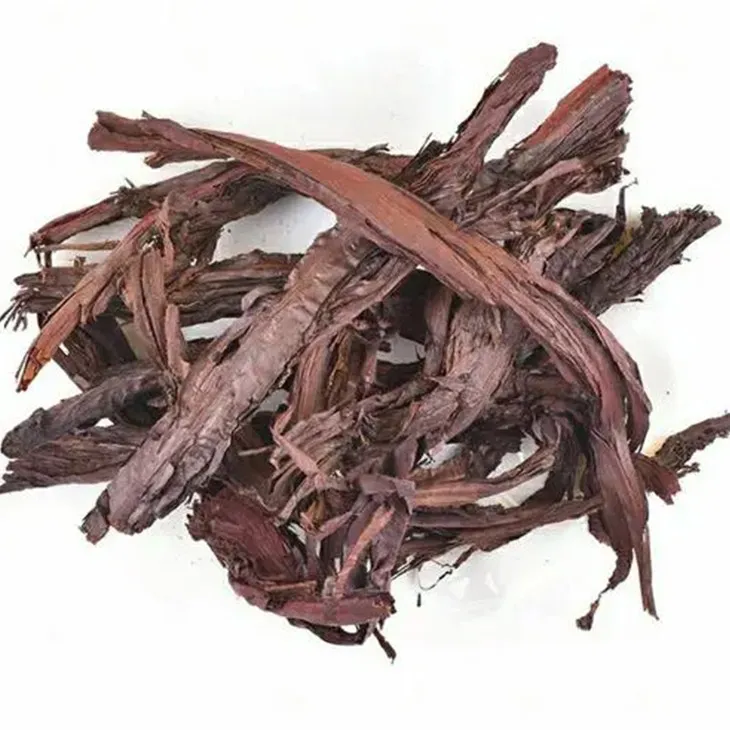- 0086-571-85302990
- sales@greenskybio.com
Benefits of Shikonin in Cattle Feed.
2024-11-13

Introduction
In the realm of cattle rearing, the quality of feed plays a crucial role in determining the overall health, productivity, and performance of the animals. Shikonin, a natural compound, has emerged as a potential ingredient with numerous benefits when added to cattle feed. This article will explore the various advantages that Shikonin offers in the context of cattle nutrition.

Antibacterial Activity
1. Gut Health and Microbiota Balance
- The gut of cattle is a complex ecosystem that houses a diverse range of bacteria. Some of these bacteria can be harmful and may lead to various health issues such as diarrhea, reduced feed efficiency, and even more severe diseases. Shikonin's antibacterial activity is of great significance in this regard. It has the ability to target and inhibit the growth of harmful bacteria in the cattle's gut.
- By reducing the population of pathogenic bacteria, shikonin helps in maintaining a healthy intestinal microbiota. A balanced microbiota is essential for proper digestion and absorption of nutrients. For example, beneficial bacteria play a role in breaking down complex carbohydrates and proteins that are present in the feed, making them more accessible for absorption by the cattle's digestive system.
- Studies have shown that shikonin can be effective against common gut pathogens in cattle, such as Escherichia coli and Salmonella species. These bacteria are often responsible for causing infections that can spread within a herd, leading to economic losses due to decreased productivity and increased treatment costs.
- In modern cattle farming, the use of antibiotics has been a common practice to control bacterial infections. However, the overuse of antibiotics has led to concerns such as the development of antibiotic - resistant bacteria. Shikonin offers an alternative approach to combat bacterial infections in cattle without relying solely on antibiotics.
- When shikonin is included in the feed, it can help in reducing the incidence of bacterial diseases, thereby potentially decreasing the need for antibiotic use. This is not only beneficial for the health of the cattle but also for the broader environment and human health, as it helps in curbing the spread of antibiotic - resistant bacteria.

Improving Stress Tolerance
1. Environmental Stresses
- Cattle are often exposed to various environmental stresses such as extreme temperatures, changes in humidity, and poor air quality. These stresses can have a negative impact on their growth, reproduction, and overall well - being. Shikonin has been found to play a role in improving the stress tolerance of cattle.
- For instance, during hot weather conditions, cattle may experience heat stress, which can lead to reduced feed intake, decreased milk production (in dairy cows), and even mortality in severe cases. Shikonin may help the animals to better cope with such heat stress by modulating certain physiological processes within their bodies. It could potentially enhance the efficiency of thermoregulation mechanisms, allowing the cattle to maintain a more stable body temperature.
- Similarly, in cold weather, shikonin may contribute to improving the cold tolerance of cattle. It might help in conserving body heat or enhancing the function of the immune system, which is often compromised during cold stress.
- Management practices in cattle farming, such as transportation, regrouping, and weaning, can also cause stress to the animals. These stresses can lead to behavioral changes, reduced growth rates, and increased susceptibility to diseases. Shikonin can be beneficial in mitigating the effects of such management - related stresses.
- For example, during transportation, cattle are exposed to confinement, motion, and changes in diet and environment. This can cause stress - related problems. Shikonin, when present in the feed prior to transportation, may help the animals to better adapt to these changes and reduce the negative impacts of stress on their health and performance.

Enhancing Reproductive Performance
1. Female Reproductive Health
- Reproductive performance is a key factor in the productivity of a cattle herd. In female cattle, shikonin may have positive effects on various aspects of reproductive health. It could potentially influence the estrous cycle, making it more regular. A regular estrous cycle is essential for successful breeding and conception.
- Moreover, shikonin may also play a role in improving the quality of oocytes (eggs). High - quality oocytes are more likely to be fertilized successfully and develop into healthy embryos. This can ultimately lead to higher pregnancy rates and a greater number of calves born in the herd.
- During pregnancy, shikonin may also contribute to a healthier gestation period. It could help in reducing the risk of complications such as miscarriages or stillbirths by maintaining a stable hormonal environment and proper placental function.
- In male cattle, shikonin may be involved in enhancing sperm quality. Sperm quality is crucial for successful fertilization. Shikonin could potentially improve sperm motility, which is the ability of sperm to move effectively towards the oocyte. Higher sperm motility increases the chances of fertilization.
- Additionally, shikonin may also have an impact on sperm morphology, ensuring that the sperm have a normal shape. Abnormal sperm morphology can reduce the fertilization ability of sperm. By improving sperm quality in male cattle, shikonin can contribute to better reproductive outcomes in the herd.
Conclusion
In conclusion, shikonin offers a range of significant benefits when included in cattle feed. Its antibacterial activity helps in maintaining gut health and reducing the need for antibiotics. The improvement in stress tolerance makes cattle more resilient to both environmental and management - related stresses. Furthermore, its role in enhancing reproductive performance is crucial for the productivity of the cattle herd. As research on shikonin in cattle feed continues, it is likely that more benefits will be discovered, and its potential for widespread use in the cattle industry will increase. However, further studies are still needed to fully understand the optimal dosage, long - term effects, and potential interactions with other feed components.
FAQ:
How does shikonin in cattle feed combat harmful bacteria?
Shikonin has antibacterial activity. It likely interferes with the normal functions of harmful bacteria in the cattle's gut, such as disrupting their cell membranes or metabolic processes. This helps in reducing the number of harmful bacteria and maintaining a more balanced and healthy intestinal microbiota.
What evidence is there for shikonin improving stress tolerance in cattle?
There may be experimental studies where cattle fed with shikonin - supplemented feed are exposed to various stressors like extreme temperatures or changes in management routines. The results would show that these cattle show better physiological and behavioral responses compared to those not fed with shikonin - containing feed. However, more in - depth research is still needed to fully understand the mechanisms behind this effect.
How exactly can shikonin enhance the reproductive performance of cattle?
It could potentially affect the hormonal balance in cattle related to reproduction. For example, it may influence the production or regulation of hormones like estrogen or testosterone. Additionally, by improving the overall health of the cattle through its antibacterial and stress - tolerance - improving properties, it can also indirectly contribute to better reproductive performance.
Are there any potential side effects of adding shikonin to cattle feed?
Currently, while the benefits of shikonin in cattle feed are being explored, research on potential side effects is still ongoing. However, if added in excessive amounts, it might disrupt the normal gut flora too much or cause unforeseen physiological imbalances. So, proper dosage studies are essential to ensure its safe use.
How should shikonin be added to cattle feed in terms of quantity?
The appropriate quantity of shikonin to be added to cattle feed depends on various factors such as the age, weight, and general health of the cattle. Also, different breeds of cattle might respond differently. At present, research is focused on determining the optimal dosage range through experimental trials and field studies.
Related literature
- The Role of Shikonin in Animal Nutrition"
- "Shikonin in Livestock Feed: A Comprehensive Review"
- "Beneficial Effects of Shikonin on Cattle Health and Productivity"
- ▶ Hesperidin
- ▶ citrus bioflavonoids
- ▶ plant extract
- ▶ lycopene
- ▶ Diosmin
- ▶ Grape seed extract
- ▶ Sea buckthorn Juice Powder
- ▶ Beetroot powder
- ▶ Hops Extract
- ▶ Artichoke Extract
- ▶ Reishi mushroom extract
- ▶ Astaxanthin
- ▶ Green Tea Extract
- ▶ Curcumin Extract
- ▶ Horse Chestnut Extract
- ▶ Other Problems
- ▶ Boswellia Serrata Extract
- ▶ Resveratrol Extract
- ▶ Marigold Extract
- ▶ Grape Leaf Extract
- ▶ blog3
-
Cranberry Plants and Skin - care Products.
2024-11-13
-
Horse Chestnut Extract
2024-11-13
-
Hericium erinaceus extract powder
2024-11-13
-
Tongkat Ali Extract
2024-11-13
-
Konjac Powder
2024-11-13
-
Black Pepper Extract
2024-11-13
-
Pomegranate Extract
2024-11-13
-
Phellodendron Extract
2024-11-13
-
Berberis aristata Extract
2024-11-13
-
Passionflower Extract
2024-11-13
-
Black Garlic Extract
2024-11-13





















